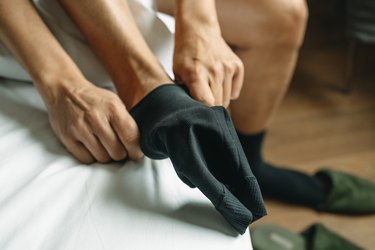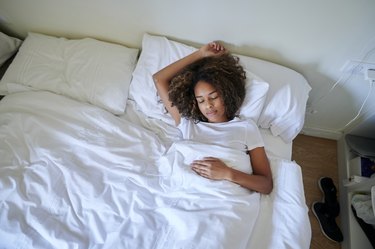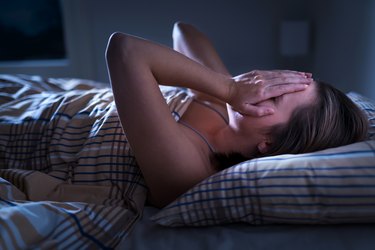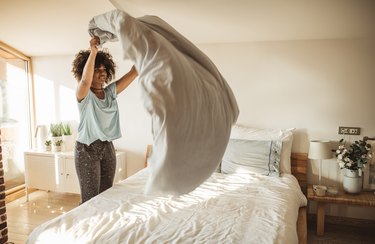
When it comes to sleeping, there are seemingly two types of people in the world: those who sleep with socks on and those who don't.
And while there's no one right way to dress for optimal rest, slipping on a pair of socks before hitting the hay might actually have benefits beyond just warming up chilly toes.
Video of the Day
Video of the Day
Here, learn about the benefits of sleeping with socks on along with other tips to get quality zzzs.
So, Does Sleeping In Socks Improve Sleep?
In short, yes, it can.
For starters, sleeping with socks on may prevent cold feet — a sensation that can be particularly uncomfortable for some folks and, in turn, inhibit their ability to fall asleep, says Daniel Barone, MD, associate medical director at the Weill Cornell Center for Sleep Medicine and author of The Story of Sleep.
But "the main theory of why wearing socks to bed may help you get better sleep is based on the concept that your core body temperature will affect how well you sleep," says Raj Dasgupta, MD, clinical associate professor at the Keck School of Medicine at the University of Southern California and spokesperson for the American Academy of Sleep Medicine.
Your body temperature is tied to your circadian rhythm (i.e., the 24-hour internal clock that regulates your sleep-wake cycle). It rises steadily throughout the day before falling at night.
When it drops, it essentially signals to your body that it's time to prepare for sleep. (This is also why a cooler room temperature is best for zzzs.)
"For core body temperature changes to happen, your body needs to be able to hold onto or lose heat effectively," Dr. Dasgupta says. "This is mainly done through your skin, which has a network of blood vessels called capillaries running under it."
Enter, socks: The garments warm your feet, relaxing and widening blood vessels — which improves circulation — to help your body release more heat and cool down overall.
As a result, you might just be able to fall asleep faster and stay asleep longer. In fact, in a landmark October 2006 study in Physiology & Behavior, researchers tested various sleep strategies on participants with and without health issues (think: chronic insomnia) and found that adults in both groups who slept with socks on fell asleep faster than those who were barefoot.
What's more, an April 2019 study in the Journal of Physiological Anthropology found that the participants — six young men — fell asleep, on average, 7.5 minutes faster and slept 32 minutes longer with socks compared to when they slept without socks on their feet.
It's important to note, though, that simply slipping on a pair at night isn't going to send you straight off to dreamland.
And it's not "a substitute for treatment for insomnia or other sleep problems," Dr. Dasgupta says, who considers it to be more of a "sleep hygiene" tactic similar to lowering the temperature and avoiding blue light before bed.
Warning
Sleeping with socks on "may not be appropriate for you if you have circulatory or other medical issues (e.g. peripheral arterial disease) that could potentially increase the likelihood of the socks restricting blood flow to your legs and feet,” Dr. Dasgupta says.
Other Benefits of Sleeping With Socks
While wearing socks to bed is not a guarantee for faster and deeper sleep, there are some other pros it can offer:
1. It Can Help Manage Raynaud’s Disease Symptoms
Cold feet are commonplace in people with Raynaud's disease or phenomenon, a condition that causes blood vessels in the extremities to constrict, reducing circulation and causing certain parts of the body — especially the fingers and toes — to become cold, numb and discolored, according to the National Institute of Arthritis and Musculoskeletal and Skin Diseases (NIAMSD).
These painful episodes can be brought on by various triggers, including exposure to cold.
"Wearing socks at night is a simple thing that can help address this common trigger," Dr. Dasgupta says. "It prevents Raynaud's from flaring up by keeping your extremities warm and your blood circulating."
2. It May Limit Menopausal Hot Flashes
Just like feeling freezing can keep you from sleep, so can sweating like you're in the desert — a common symptom called "hot flashes" that can occur during menopause.
Hot flashes — aka night sweats — can unfortunately also disrupt your nightly zzzs. They are caused by hormonal fluctuations that throw off your thermoregulatory system.
In other words, if your hormones are out of whack, your body temperature might be thrown off, too.
But thanks to their ability to lower core body temperature, socks can help you avoid any sudden spikes in temperature that can make it difficult to fall and stay asleep, Dr. Barone says.
Tip
If you deal with night sweats from menopause, try some of these products for hot sleepers, or these natural remedies for hot flashes.
3. It Can Help Moisturize Your Feet
Dry, cracked skin can be uncomfortable on any part of your body, but especially when it's on your feet and heels.
Wearing socks to sleep can soothe any irritation that might be brought on by your barking dogs. It's simple, really: Applying lotion to your feet (like one of these best foot creams) before putting on a pair of cotton socks can help lock in the moisturizer so that it nourishes your skin and help keep your feet from further drying out, according to the Cleveland Clinic.
Which Types of Socks Are Best for Sleeping?
When choosing which socks to sport for bedtime, both experts we interviewed emphasized that comfort is key.
"You don't want anything that's too tight or irritating," Dr. Dasgupta says. After all, being distracted by discomfort will just limit the socks' potential to improve your sleep.
More specifically, the Cleveland Clinic recommends sleeping in socks made of natural fibers such as cotton, cashmere or Merino wool, as they offer both warmth and breathability. (The best socks for sweaty feet are made from these materials.)
Whatever you wear, though, make sure to practice basic hygiene — clean your feet and switch up the socks nightly to avoid bacteria buildup and skin irritation.
Can You Sleep in Compression Socks?
Unless you have a specific medical issue (like a vein disorder or swelling) that calls for constant or nighttime wear of compression socks or stockings, there's no need to wear compression socks to sleep.
"The thought process of wearing them at night doesn't make a lot of clinical sense because during the night, you're lying down, unlike during the day, during which you're more likely to be standing up, which causes blood to pool in the lower extremities — something that compression stockings can help address," Dr. Dasgupta says.
If you're looking to promote blood flow when you sleep, elevate your legs by, say, stacking a few pillows under them, Dr. Dasgupta says.
The Bottom Line
If you prefer sleeping barefoot and do so soundly, then keep on doing you.
But if you are struggling to score shut-eye and have previously left your feet to roam freely under the covers, then wearing socks to bed could be an easy, inexpensive technique to try.
Keep in mind, though, it's not some magical solution or a treatment for a true sleep disorder. And people with certain medical issues that affect circulation should check with a doctor first.
Otherwise, you should be safe to slip on a pair and hit the hay.
- Cleveland Clinic: "Can Wearing Socks to Bed Help You Sleep Better?"
- Physiology & Behavior: "Skin temperature and sleep-onset latency: changes with age and insomnia"
- Journal of Physiological Anthropology: "Effects of feet warming using bed socks on sleep quality and thermoregulatory responses in a cool environment"
- NIAMSD: "Raynaud’s Phenomenon"
Is this an emergency? If you are experiencing serious medical symptoms, please see the National Library of Medicine’s list of signs you need emergency medical attention or call 911.


